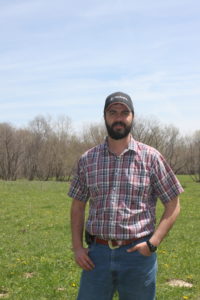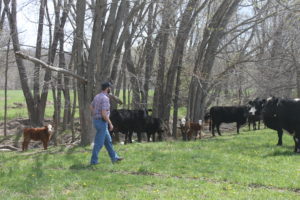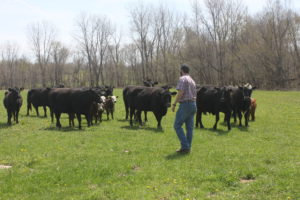
Allan Sharrock Jr. lost seven calves in a flood in Randolph County, Missouri.
By Jessica Claypole, Missouri FSA Public Affairs & Outreach Specialist
In Missouri, the saying goes “if you don’t like the weather, wait five minutes and it will change.” Cattle producer Allan Sharrock Jr. knows the truth behind this statement, as he experienced it first-hand the morning of March 26, though the change in weather proved to be devastating.
Excessive rainfall caused streams and creeks to swell quickly and without warning across portions of Randolph County, Missouri. Sharrock’s farm was in the heart of the flooding, and when the water rose, seven calves were swept away.
“Losing this many calves on a small operation like mine really hurts the bottom line,” Sharrock said. “Cows help make my farm payment each year. This was a huge loss.”
Sharrock contacted his local USDA Farm Service Agency (FSA) office and informed the staff of the loss to see if they could help. County Executive Director Henry Westhues and Program Technician Keith Kroner worked with Sharrock to file an application under the Livestock Indemnity Program (LIP), which provides benefits to livestock producers for deaths caused by adverse weather events.
Sharrock was compensated for his cattle losses, above normal mortality rates, due to the flash flooding. He says the benefits he received go beyond just helping with his hay costs in the coming months.
“Without the funds, it would be hard to justify keeping the cows over the winter,” Sharrock said.

The Livestock Indemnity Program (LIP) from FSA helped him recover from his losses.
Agriculture has always been a way of life for Sharrock, having grown up on a cattle operation in rural Missouri. His father owns a livestock market in southeast Missouri and Sharrock holds a bachelor’s degree in agricultural education.
“I have always enjoyed the rural lifestyle,” he said.
Now, he is carrying on the family farming tradition with his wife and four-year-old daughter. Sharrock operates a small commercial cattle operation, totaling about 160 acres. He keeps about half of this ground open for grazing his cattle herd and horses. He harvests triticale and rye to produce hayledge to help feed his livestock through the winter months.
Sharrock has worked with the local USDA Natural Resources Conservation Service (NRCS) to implement a grazing system through the Environmental Quality Incentives Program (EQIP). EQIP helps producers conserve natural resources while also improving agricultural operations and has proved beneficial for Sharrock’s operation.
“The improved pastures and grasses I planted really make a difference on gain with the calves,” he said.
Sharrock says it’s worth sitting down with your local USDA staff to see what programs they have to offer.

Sharrock also implemented a grazing system through NRCS’s Environmental Quality Incentives Program (EQIP).
“Even if they don’t have something that fits with your own operation, you might learn something that could help your neighbor,” he said.
Additional livestock programs available through the FSA include the Livestock Forage Disaster Program (LFP), which compensates eligible producers for grazing losses, and Emergency Assistance for Livestock, Honeybees, and Farm-raised Fish Program(ELAP), which provides emergency assistance to eligible producers for losses not covered by LFP or LIP.
For more information about FSA programs and services, contact your local FSA office or visit www.fsa.usda.gov. To find your local FSA office, visit farmers.gov.






One Response to Livestock Program Helps Missouri Cattle Producer Recover Losses from Flash Flooding